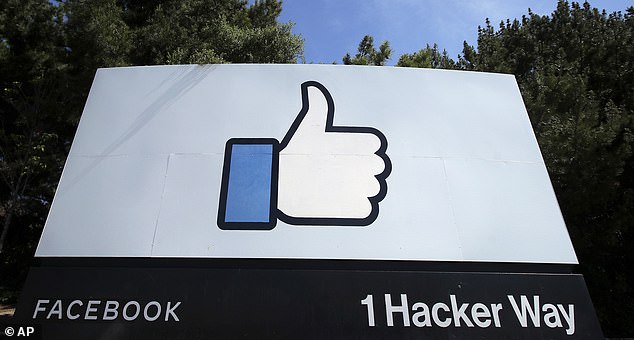Facebook says it has already registered 2.5 million Americans to vote in the upcoming presidential election, with a goal of registering 4 million total before Election Day.
In a blog post in advance of National Voter Registration Day on Tuesday, the social-media giant touted its combined registration figures from Facebook, Instagram and Messenger, extrapolating from conversion rates from several states.
So far, an estimated 39 million people have visited Facebook and Instagram’s Voting Information Centers.
‘With six weeks until Election Day and registration deadlines fast approaching in many states, this week we’re putting the full force of our platform behind this campaign to empower every eligible voter to make their voice heard in this election.’
Scroll down for video
Facebook announced it’s already registered 2.5 million new voters in advance of Election Day November 3, with a goal of registering 4 million people total. The campaign is part of the platform’s ongoing effort to thwart disenfranchisement and misinformation doing the campaign season
Last weekend, Facebook launched a poll-worker recruitment drive to help staff election centers facing shortages because of the coronavirus pandemic.
It also started pinning voting information at the top of all three apps, with links to official state voting websites and nonpartisan voting organizations.
The voter hub will remain top-of-feed through September 25.
Today, Facebook announced a national campaign, ‘More Questions, More Answers,’ would appear on both Instagram and Facebook with the aim of directing people to its Voting Information Centers ‘to help ensure their vote is counted in this election.’

Screenshots from Facebook’s voting information hub. On Monday Facebook announced a new national campaign, ‘More Questions, More Answers,’ would appear on both Instagram and Facebook
The company said this was the first time a campaign was being deployed on both apps, and it will be highlighted in radio and TV spots nationwide.
New National Voter Registration Day stickers are launching Tuesday and users who download them will be added to a special Register To Vote story.
On Tuesday morning, Facebook Watch will kick off a one-hour Vote-A-Thon 2020 special with celebrities and public figures calling Americans to get out the vote and celebrate ‘the unsung heroes of the election process.’
Next week information about early voting and vote-by-mail will start appearing in feeds of users where they’re available.
Social media, and Facebook in particular, was criticized for allowing misinformation campaigns to taint the 2016 election.
CEO Mark Zuckerberg announced the company will remove all political ads a week before the election, though users can deactivate such ads now if they choose.
‘This election is not going to be business as usual,’ Zuckerberg wrote. ‘We all have a responsibility to protect our democracy.’
Adam Chiara, a communications professor at the University of Hartford said Facebook seemed to be acknowledging the power it holds over the upcoming presidential race.
‘Maybe some steps they are taking work and others are mistakes,’ Chiara said, ‘but I would rather have the platform try to be a positive force than be in denial of the role it plays in our democracy.’
Other social media platforms have also announced intense efforts to prevent election tampering.
Twitter will remove or label unverified postings claiming electoral victory prematurely, and YouTube is taking down content aimed at manipulation, including ‘videos that contain hacked information about a political candidate shared with the intent to interfere in an election,’ according to a statement.
YouTube will also remove videos promoting efforts to interfere with the voting process such as telling viewers to create long voting lines.
Last week, Snapchat announced it had registered more than 400,000 new voters, more than half of whom were between the ages of 18 and 24.
More than half of Snapchat users who registered through the app in 2018 voted in the midterm elections, highlighting the power of social media as an election driver.
